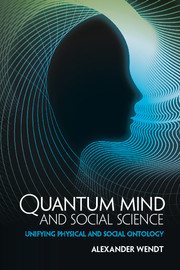Book contents
- Frontmatter
- Dedication
- Epigraph
- Contents
- Acknowledgments
- 1 Preface to a quantum social science
- Part I Quantum theory and its interpretation
- Part II Quantum consciousness and life
- 5 Quantum brain theory
- 6 Panpsychism and neutral monism
- 7 A quantum vitalism
- Part III A quantum model of man
- Part IV Language, light, and other minds
- Part V The agent-structure problem redux
- Conclusion
- Bibliography
- Index
7 - A quantum vitalism
from Part II - Quantum consciousness and life
Published online by Cambridge University Press: 05 May 2015
- Frontmatter
- Dedication
- Epigraph
- Contents
- Acknowledgments
- 1 Preface to a quantum social science
- Part I Quantum theory and its interpretation
- Part II Quantum consciousness and life
- 5 Quantum brain theory
- 6 Panpsychism and neutral monism
- 7 A quantum vitalism
- Part III A quantum model of man
- Part IV Language, light, and other minds
- Part V The agent-structure problem redux
- Conclusion
- Bibliography
- Index
Summary
The thrust of the last two chapters was ever more micro, beginning with quantum brains and then projecting the essence of their subjectivity all the way down to the sub-atomic level. While that might seem to have taken us very far from the world of social science, I am working toward just the opposite conclusion: that social life is not essentially different from that of sub-atomic particles. To complete this argument, however, I need to bring matters back to macroscopic reality, which I shall do in this chapter by considering some implications of this ontology for the nature of life. That is a big topic in its own right, and ultimately I am interested here only in one very unusual form of life, our own. Still, there are two reasons to bring up the subject.
One is that from a quantum perspective human life is essentially continuous with, rather than qualitatively different from, other organisms. Apart from its potential ethical implications, this means that in speaking of life in general I will be laying a foundation for the quantum model of man discussed in Part III. The other reason to bring up the nature of life is that the view of it which follows from the ontology above is a kind of vitalism, according to which life is constituted by an unobservable, non-material life force or ´lan vital. Since vitalism today is almost universally rejected as unscientific, and the threat of which I used to motivate my proposal to give intentional explanations a quantum basis, it seems important to follow quantum consciousness theory through to its logical conclusion, and then from there, try to turn the threat of vitalism into a willing embrace.
The key to this strategy is the phenomenon of quantum coherence. Addressing the combination problem for panpsychism, in Chapter 6 I argued that coherence in the brain explains the unity of consciousness at the human level.
- Type
- Chapter
- Information
- Quantum Mind and Social ScienceUnifying Physical and Social Ontology, pp. 131 - 148Publisher: Cambridge University PressPrint publication year: 2015



